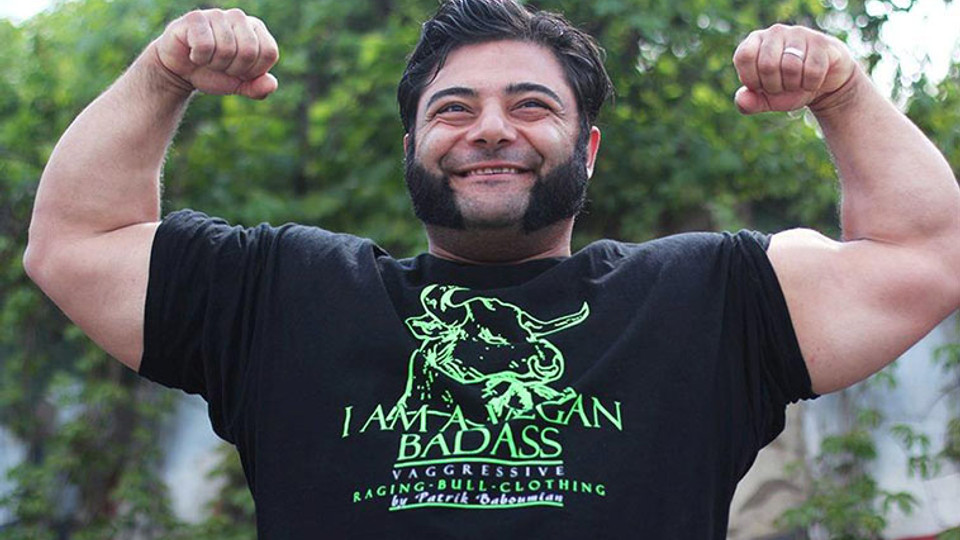
Patrik Baboumian is a German strongman and strength athlete, a former bodybuilder and, as I’ll be focussing on in this article, an outspoken advocacy of plant-based diets. Veganism has been rising in popularity for many years now, with people turning to it with a mixture of health, ethical and environmental concerns in mind. However, barbell athletics have always been quite staid in their approach to dieting: eat lots of chicken and eggs, drink lots of whey protein, rinse and repeat.
How can veganism fit into this equation?
Before I answer this question, however, let’s take a quick look at the man behind the message.
Patrik Baboumian: a brief history
Patrik Baboumian is a German strongman. He developed an early interest in weight training early in life and pursued a career as a bodybuilder as a younger man. He won the IFBB German Junior Bodybuilding Championship in 1999 and was junior champion at the 2002 Gießen Campions-Cup. His pedigree as a bodybuilder is therefore decent, but these days he is better known as a strength athlete.
Baboumian’s accomplishments in the strength arena
Baboumian has competed at IFSA Strongman events since 2006, and he competed at the FSA -105kg World Championship in 2007, placing 14th overall. He holds the world record in the sub 105kg category for the log lift, maxing at 165kg, as well as the title of ‘Strongest Man of Germany’ in the 105kg division. His accolades continue, however: he has placed in and/or won championships all over the world and has yoke-walked over half a ton under competition conditions.
Baboumian is set to appear in a documentary presented by Arnold Schwarzenegger, Jackie Chan, Lewis Hamilton and James Cameron in September, entitled ‘The Game Changers,’ in which he will be talking about his strength journey with veganism.
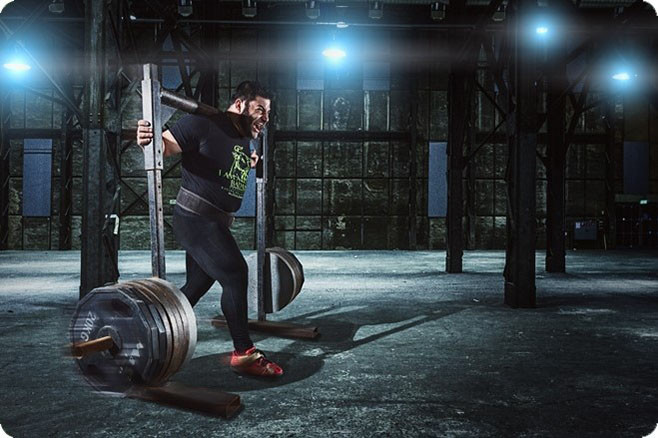
His credentials are fairly sound, then: if this man talks to you about what strength training should involve and look like, you should listen.
The diet: going green
All this makes it more surprising, therefore, that Baboumian follows and advocates a vegan diet and lifestyle. His diet is completely different to that of most strongmen. World champions like Brian Shaw and Eddie Hall eat their way through a half dozen eggs and a side of beef for breakfast and continue each day in this vein. Though he is not to their standard (each of the above have won World’s Strongest Man at least once) Baboumian’s accolades certainly both make him worth paying attention to and show that you can be insanely strong whilst living on plants.
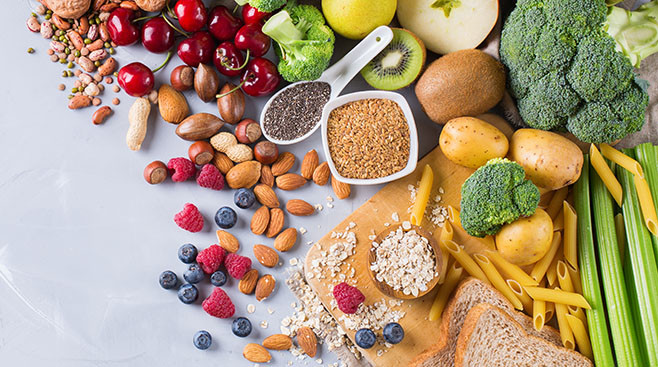
It’s worth noting that many of his records were set whist he was a vegetarian, not a vegan. He only went vegan in 2011. However, he won the European Powerlifting Championships in 2012 and broke his own yoke world record in 2015, whilst on his vegan diet. Baboumian continues to be as strong as ever- in fact, he says he is improving every single day- and has worked in sports nutrition in recent years, helping others to replicate his accomplishments.
Most people react with disbelief when they see him, see what he can do, and then find out he’s a vegan. As a vegetarian strength athlete myself, I can understand this. Many people have asked me repetitions on the theme of ‘how can you be strong without meat?’ This is understandable as most industry icons advocate animal products- they are complete proteins and easy to consume in volume.
However, there are plenty of plant-based protein sources that will give you everything you need: if like Baboumian, you don’t like the idea of killing animals for sustenance, this is good news indeed.
But how? What do you eat?
This is another question I get asked a lot. Well, I don’t need to answer it: I’ll let Patrik Baboumian do it for me. He recently opened up about what he eats in a day, detailing a sample of his 5,000 calorie daily intake and breaking it down to prove that it’s possible to be vegan and still get everything you need to be one of the strongest men in the world.
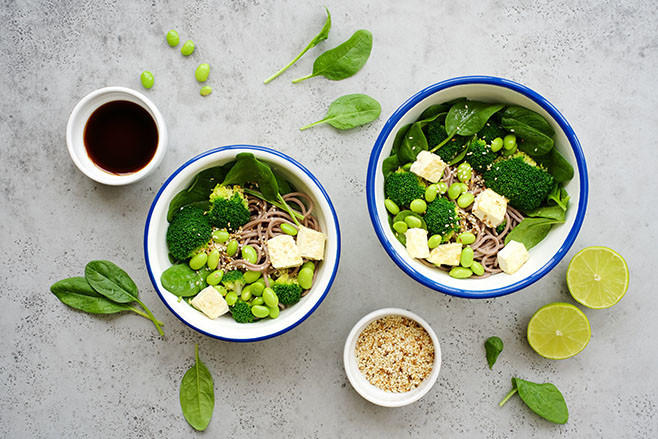
The diet
Baboumian begins his day with an 80 gram protein shake. Soya and pea protein powders have been improving greatly in recent years, so that their recipes match more mainstream whey powders. He adds 5 grams of creatine and 3 grams of beta-alanine to this, rounding off the mixture.
Next up is his post-workout meal. This is a smoothie of mixed fruits and a further 80 grams of protein. Additional supplements go into this one, too: more beta-alanine and creatine, glutamine, turmeric and cinnamon to fight inflammation, and 5-10 grams of BCAAs (very important on a vegan diet).
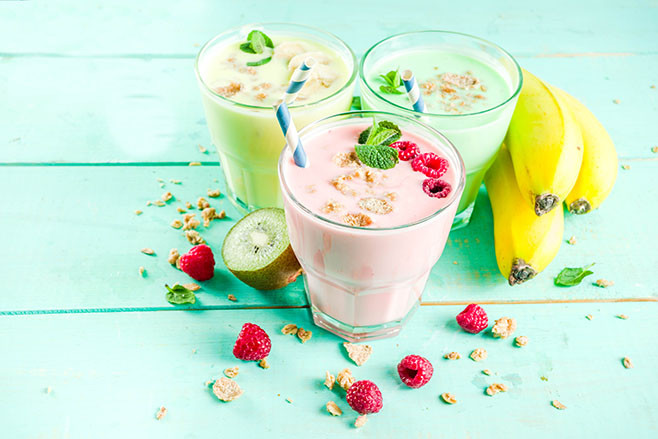
For lunch, he details vegan sausages (commonly made from mycoprotein), falafel, low fat over fries and mixed veg. This is one of his big daily carb intakes.
His afternoon snack is another protein shake: 50 grams this time, with 5 grams of added fat. Then, for dinner, he gets through more mixed veg, cooked potatoes to round off his carb requirements, and tofu for protein.
Before bed, he will then tuck into some mixed nuts or peanuts, washed down with a final 50 gram protein shake.
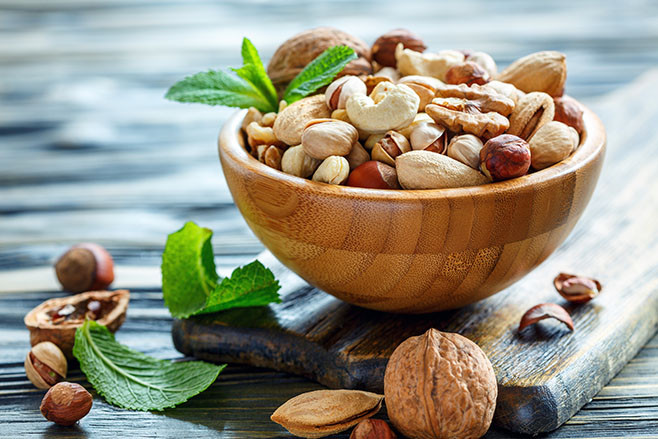
The end results
Though this eating plan relies heavily on supplements in the form of protein shakes and added powders, so do most barbell athlete’s diets. Imagine eating your way through your daily protein needs in pure, whole-foods. You would be exhausted and bored from eating, and the excess carbs and fat that came with it would make you pile on the kilos.
All told, the macros from Baboumian’s sample day add up to:
| Calories | 5,320 |
| Protein (g/calories) | 410/1640 |
| Carbohydrates (g/calories) | 470/1880 |
| Fat (g/calories) | 200/1800 |
In caloric terms, as we can see, this is a fairly even split between macronutrients. With a decent range of sources, and the inclusion of BCAA supplements, he will be getting a full complement of amino acids in his diets, alongside everything else a growing boy needs to lift a half-ton yoke. This is solid.
You may disagree with his ethics, by all means, and you may want to keep animal products in your diet, but you can’t argue with the guy’s success.




